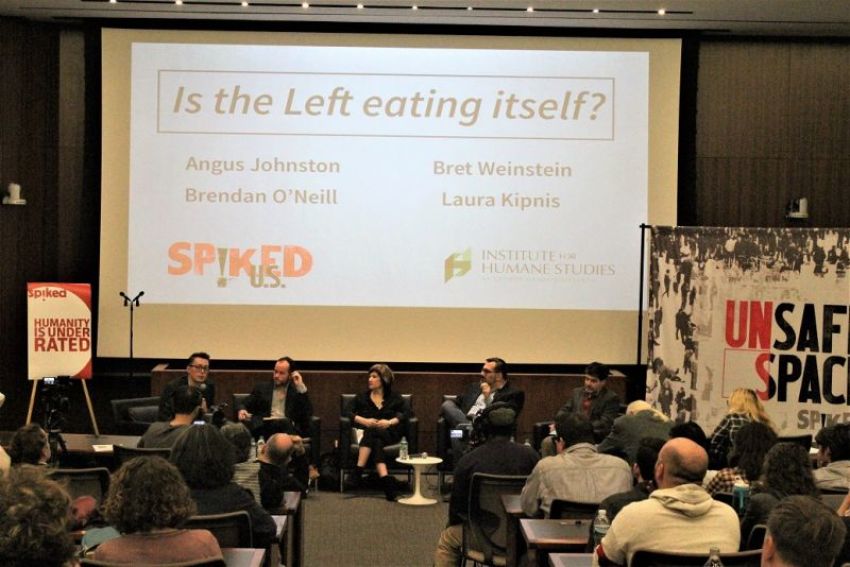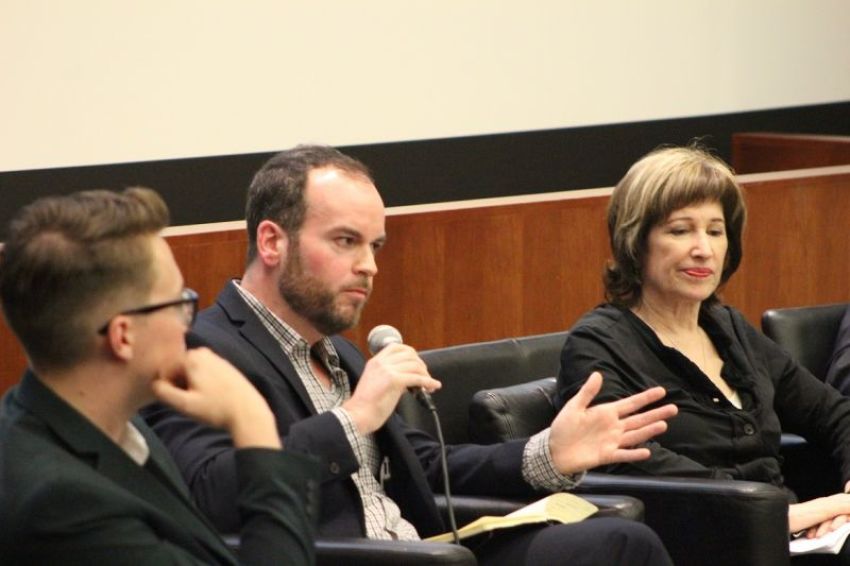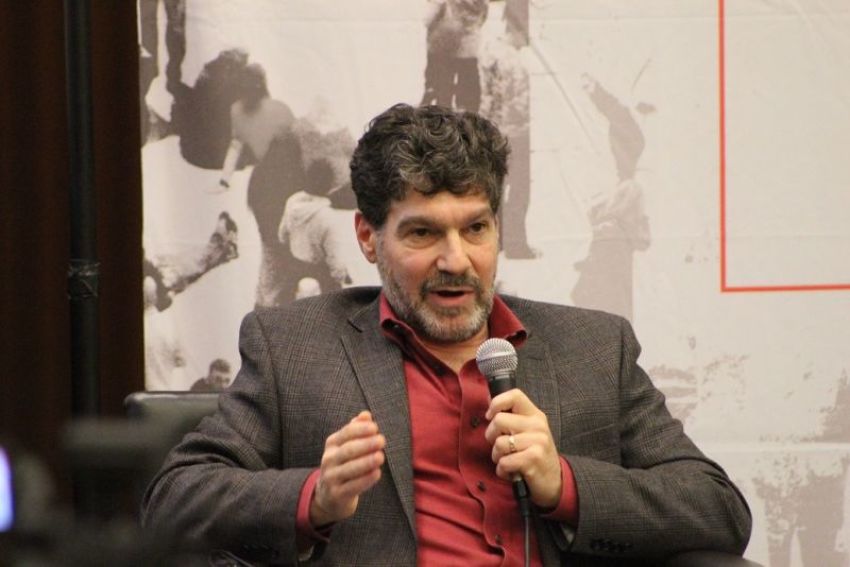Is the Left Eating Itself on College Campuses?

NEW YORK — For some left-wing advocates, the answer is a clear "yes" or "no." For others, however, deciding whether or not the Left is eating itself is a bit more complicated when it comes to assessing restrictions on free speech on college campuses today.
In a spirited debate on the matter inside the auditorium of the New York University Law School in lower Manhattan last Thursday, four of the most controversial left-wing voices to emerge in the debate in recent years pondered the question: "Is the Left eating itself?"
In varying degrees, all of them except one agreed that it isn't.
Brendan O'Neill, a free speech absolutist and editor of spiked, Britain's first online-only current affairs magazine, dismissed the movement to silence some voices on campus that students don't agree with as simply "not left."
"They are not left. And I understand that's semantics but it's incredibly important that we get this right. I know they call themselves left but North Korea calls itself a democratic republic. People lie and more importantly people use progressive phrases to disguise reactionary agendas. That is a longstanding historical phenomenon and that is what we face on campus today — the dressing up of the new reaction against enlightenment thought as something progressive," he said.
"I think what we face on campus today and across many institutions in the West today is far worse than left on left battles. We face the slow motion agonizing death of enlightenment thought and the return of reactionary ideas," O'Neill explained.
And he should know, he was banned from Oxford University in 2014 because of his freewheeling views. Now he's stirring debate on U.S. university campuses with Spiked's "Unsafe Space" free speech tour.
"What we have on campus in the U.S. and the U.K. today is not left," he said. "It's hyper racial consciousness."
Despite the ongoing debate on sexual assault and racism on college campuses, the current movement that has been sweeping college campuses seeking to police discussions on the subjects isn't in line with liberal thought.
"This insistence on female fragility, this paranoid philistinism so that books are defaced with trigger warnings and everything from tabloid newspapers to sexy pop songs can be banned. This disavowal of your own autonomy, your own adulthood, and you're bleeding with bureaucracy to provide you with psychic comfort. This use of racial phrases like white men, as if all white men have the same privilege, as if class, the building block of left politics was irrelevant for such as small thing that didn't bear talking about. None of this is left," O'Neill said.
"None of this is what I understand to be left. In fact, it has far more in common with the politics of reaction than it has with the politics of the left. It is a replay, in my view, of the carnivals of reaction that greeted the rise of enlightenment thought. The birth of mass democracy, the liberation of women and ethnic minorities from second class oblivion. In my view, today's campus agitators better resemble the reaction against those progressive radical leaps forward for humankind than they do progressive radical leaps forward themselves," he argued.
The "politics on offer is either black self-pity or white self-loathing," O'Neill said, arguing that it is also demeaning to women and ethnic minorities.
Laura Kipnis, a feminist essayist and professor of media studies at Northwestern University whose writing on campus sexual harassment policies caused her to become the subject of two Title IX investigations at Northwestern, gave a "provisional no" to the question if "left" was taken to mean broadly "anti-capitalist" and if by "eating itself we mean broadly the freedom of speech on campus issue."

"There is no such thing as free speech. There is no free marketplace of ideas because some idea monitors have more purchasing power than others or better positioned in the idea marketplace. Markets don't produce equality and they never have. In fact, they produce massive inequality," Kipnis argued.
"Look around, check out some wealth and income distribution data. In this context, I do find it difficult to deny that the free speech argument is a comforting illusion. A cover for the fact that comforting interests determine who can speak and who gets heard and by how many. Will net neutrality last for another five minutes, by the way?" she quipped.
To gain access to free speech, she argued, you have to be able to represent yourself to be a part of the discourse. Free speech she explained is "not a birthright. It is a political right that ... has to be fought for."
"I fully believe there is a fatal anti-intellectualism sweeping American campuses that has to be addressed. And much of it revolves around identity politics" where campus cultures increasingly favor feelings over intellect she said.
"When I see videos of demonstrators at Evergreen or Wesleyan saying they don't need to read books because 'we know what our experiences have been' and shouting down faculty, I, too, want to blame identity politics but that's to be as simplistic as the students who want to shut people up who offend or trigger them. Instead, we on campus, faculty, have to help students get over the fear vs. experience dichotomy, understand that experience in itself, by itself, is meaningless. The only way to make sense of it is with distance and retrospect," Kipnis explained.
She did not, however, support the idea that all speech should be allowed on campus.
"All speech and all ideas don't have a place on campus. There are intellectual standards to obtain and principles to uphold. And most importantly, the most important one is that campuses are inclusive places. Not venues to debate whether blacks or Muslims or trans students deserve social equality. Those debates have been settled," she said.
"If student Republicans want to invite all bright and edgy neo-fascists speakers, they can invite them on campus. If it were 1932 and they invite Joseph Goebbels to campus to debate whether Jews and homosexuals should be removed from Germany on the principle that good speech will trump bad speech and all ideas deserve a hearing — No. A campus president should not be doling out hundreds of thousands of dollars in security costs to defend idiots ... whose ideas are opposed to our core values," Kipnis said."... The time to stop inviting fascists to campus is right around now.
Angus Johnston, a historian of student activism and student government, and a professor at the City University of New York agreed that the Left isn't eating itself while delivering an unconventional interpretation of what he believes free speech means.
"As I was growing up, thinking about the concept of free speech, the place you would always go is Skokie," he said after admitting he's a big "ACLU guy"
The Skokie case refers to a time in 1978 when the ACLU took a controversial stand for free speech by defending a neo-Nazi group that wanted to march through the Chicago suburb of Skokie where many Holocaust survivors lived.
"The example that you would always give that if you were really for free speech you had to be for the free speech of the Nazis in Skokie. And the way that that was formulated was that to be for free speech means to be most of all for the speech of the people you hate the most," Johnston explained.

"The people that you hate the most are the Nazis so that's where you go. I think that's wrong. I think that to be for free speech means that you have to be for the free speech of most of the people whose free speech is most under attack. If the people that you hate the most are relatively privileged in terms of having the ability to avail themselves of their First Amendment rights, then they are not the people that you need to be supporting the most," he argued.
"The people that we [should be] supporting the most are the people that are most under attack. It is very easy to defend the people that we really, really hate who are exactly the opposite of us. It is a lot harder to defend the people who we really, really hate, who are kind of like us. The people who are sort of on our team but who we think are completely messing it up — that's the people that's really hard to defend," he said.
Bret Weinstein, an evolutionary theorist and former Evergreen State College professor who was forced to resign after he became the center of a national news story when he criticized an anti-racism protest at the college that demanded white people stay away from campus, was the only member of the panel that concluded that the Left was indeed eating itself.
"Yes. Of course it is. It is transparently obvious that it is what is going on," said Weinstein.
He then suggested that there may be a problem with the "game theory of progressivism."
"It's quite possible based on what is taking place that the left has a bad actor problem that arises out of some of the fundamental assumptions of progressivism," he said.
"I do think it's possible to construct a left that is more or less immune to a bad actor problem. But what I'm witnessing in the present are bad actors that have control over the entire dialogue. And that is a very dangerous situation.
"And so the first thing that I recognized a bit before things went haywire at Evergreen publicly, was the people I was talking to, most of the population at Evergreen is pretty far left. But I recognized that there was a hidden dichotomy between two populations within the left. One of those populations earnestly wishes equality ... then there is another population that does not wish equality" but to turn the tables on oppression he said.
"The problem for us is that when these two populations are intermingled, they sound alike," he added.
He charged that people who are seeking equality are unaware that they have signed up with something unholy and un-American. And a consequence of that problem, he said, is people like him face a social penalty for opposing it.
"If you recognize it as an insurgency and you stop listening to what it says it is going to accomplish, it will be much clearer what is taking place," he explained.



























